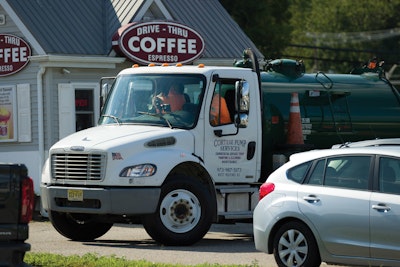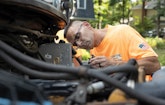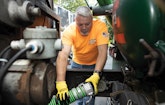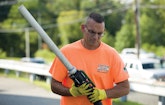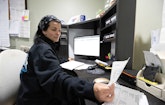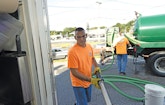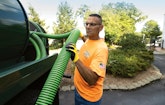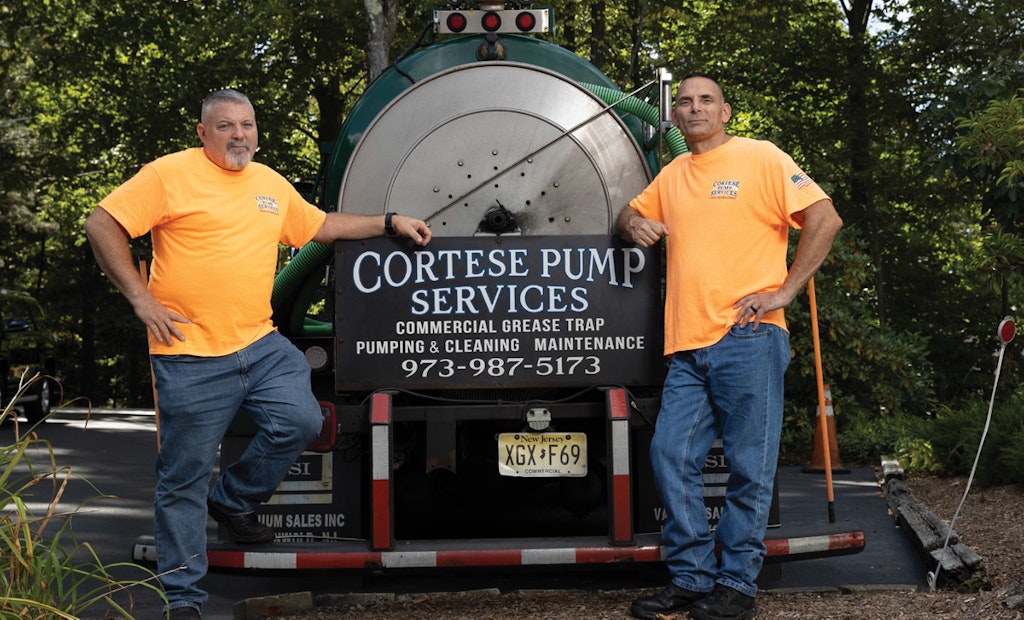
Shown with a grease service truck built out by Imperial Industries is technician Mike Toscana, left, and owner Kurt Cortese. (Photos by Steve Hockstein)
Interested in Grease?
Get Grease articles, news and videos right in your inbox! Sign up now.
Grease + Get AlertsAs a child, Kurt Cortese enjoyed going to his grandfather’s pharmacy and hanging out, later doing the same when his mother and her brother took over the business. He learned the value of working hard, how to interact with the public and the importance of customer service.
The seeds of entrepreneurship were sown.
When he started pumping grease traps for a company, he knew someday he’d have his own business. After about five years with the contractor, he and his wife Stephanie began researching the requirements, and in 2016 they made it happen.
Their company, Cortese Pump Services, is in Wayne, New Jersey. A retired friend, Mike Tostano, helps out three or four days a week. In addition to pumping grease traps and interceptors, Kurt is licensed to perform grease trap inspections, including collecting water samples for the lab, to ensure the grease going into the sewer system does not exceed acceptable levels.
They generally work within a 40-mile radius but will go anywhere in New Jersey, if requested, adjusting their price for the extra time and fuel.
Kurt and Stephanie make a good team, complementing each other’s talents. He takes care of the dirty work, she handles the paperwork. He admits he’s somewhat “computer dumb,” she’s the techie managing their website and social media. He’s the down-to-earth guy who wants to keep the company size manageable, she’s the dreamer thinking about adding storm sewer cleaning or setting up a grease recycling facility.
SLOW GOING
It took about a year and a half for the couple to put everything in place. Stephanie started in on the licensing and permitting process. Fortunately, her background exactly prepared her for this task. She had worked as a paralegal so she was comfortable handling legal requirements. She also has a degree in accounting and had been employed by a certified public accountant, specifically working with plumbers, electricians and small businesses.
“It was a lot of work on her end,” Kurt says. “It took a lot of time to get everything legal. We had to take a class; we had to get fully licensed. Then there’s your DOT (state Department of Transportation ) and your DEP (state Department of Environmental Protection) requirements. It’s a process.”
Meanwhile, Kurt was researching trucks. “It helped having worked for another company,” he says, “because I saw what I liked, what I didn’t like, what was harder, what made it easier, seeing what other companies had and talking to them.” He relied on a dealer, Vacuum Sales Inc., to find something that met his requirements and had been well cared for.
“We dealt with the owner Jimmy (Redstreake) and his sons for a year and a half. They did the hunting for us, then when they thought something was worth it, they had me go down and look at it.”
The truck they settled on was a 2009 Freightliner built out by Imperial Industries with a 1,500-gallon steel tank and Masport pump. Kurt asked Redstreake to add a few extras.
“They extended the frame for the inlet and outlet of the pump system, and put an electric reel on it with 300 feet of hose,” he says. “Some trucks just have 25-foot sections of hose, maybe 10 of them. So, rather than pulling up to a job and taking all the sections off, I grab one end of the hose and just walk to the trap. And then it winds up by itself.”
THOROUGH CLEANING
Kurt has since bought a second truck, a 2006 Ford F‑650 built out by Imperial with a 1,000-gallon steel tank and Masport pump. And he hopes to soon take delivery on a 500-gallon aluminum tank from Imperial with a Masport pump, likely paired with a Ford F-450 or F-550.
“It’s more maneuverable,” he explains. “I want to take more work in Hoboken and Weehawken where you really need the tiniest truck you can get. The streets are narrow and there are a lot of buildings that have no back entrances so everything has to be done through the front door.”
Customers include Dunkin’, Pizza Hut, Fresh Grocer, as well as schools and a lot of mom-and-pop grocery stores and restaurants. Kurt says their service is very thorough.
“We pump the tank completely down, scrape the walls, hose down the baffles and inlet and outlet pipes, inspect the trap and make sure there’s no rot or holes. Most of the time, we get new accounts because I have a reputable name, doing just what the people expect to be done.
For grease blasting they use Pressure-Pro pressure washers — gas-powered for exterior tanks and electric for inside traps. “If it’s real bad we have a diesel machine that heats up the water to 300 degrees so it’s easier to clean up the sidewalls,” Kurt says.
Most of his customers are on a maintenance schedule. The company has contracts with their larger clients but Kurt does not require it for the smaller ones. “If I’m not doing a job correctly or if I’m saying I’m going to be there every Friday at 7 a.m. and I’m not, they have every right to get somebody else,” he says.
For most of the municipalities, three months is the maximum time allowed between service calls. Kurt doesn’t like to go longer than that because too many problems arise. “I even have some old-timers, Italian pizzerias, that do it twice a month because they just don’t want any issues,” he says. “They’re sticklers about that. They don’t want the odors. In the summertime you get a lot more odor because it’s humid.”
HOME OFFICE
Kurt and Stephanie operate the business from their home. “When we decided to do this, we were also in the process of looking for a house and property that we could put a garage on and keep everything right here,” Kurt says. “It’s a lot easier getting up at 4 a.m., walking to the garage, starting up the truck and going right to work compared to driving 15 or 30 minutes to a shop.”
It’s also easier to respond to emergency calls, Kurt says. And it allows him to clean the trucks when he has a few minutes here and there. The downside of working at home is never really getting away from the business. The couple has two preschoolers so they also value their family time.
Having a home office is also more convenient for Stephanie, who now works full time for the company. She focuses on bookkeeping, answering emails, posting to social media and handling regulatory requirements.
“And compliance is one of the most important things in this company — to keep our clients in compliance,” Stephanie says. “You’ve got to submit the paperwork to the municipalities. Once or twice a year they ask you for all the invoices. Kurt inspects the traps and then the companies have to continue with maintenance whether they like it or not. The regulators email me, ‘Are they continuing the service?’ That’s where I spend a lot of my time.”
BIGGEST CHALLENGE
Kurt usually starts his day around 4 a.m. and finishes up by 1 or 2 p.m. Monday through Friday, although some customers require night or weekend service. A lot goes into scheduling and routing, which he says is one of the most difficult aspects of the job. He has to take into account each company’s maintenance schedule, what hours the facility is open, the schedules of other contractors such as trash collectors who might also need the same alley or parking place, school activities, traffic and parking conditions.
And he wants to plan a daily route that avoids unnecessary travel time. And, finally, he has to contact each company to confirm that the schedule he has in mind will also work for them. “I’ll shoot them a text. There’s so much going on and I don’t want to be in anybody’s way and they don’t want to be in my way,” he says.
At the beginning of each month, Stephanie gives Kurt a printout of upcoming jobs for the month. “I do old school,” Kurt says. “I have a date calendar book with what I do for the day, what calls I made today. When I get home, I make my calls for tomorrow and have my route planned. You have to make sure you can get in and out and do the job quickly enough.” Kurt has quite a few keys and his own alarm code to different establishments.
A PROUD ENTREPRENEUR
Future plans are to continue growing the company at a measured pace. Adding more employees will be done cautiously. “There’s a lot of stress when you have a lot of people to manage,” Stephanie says. “There’s a lot of drama. But right now things are going very smoothly.”
While Stephanie enjoys handling the office work, Kurt says one of the benefits of the job for him is not being in an office. “I’m always in a different spot,” he says. “And I like seeing my customers. I was used to that, having that relationship, because that’s what I grew up with.”
Kurt is proud to be carrying on the family tradition of business ownership. “I saw how my family liked taking care of people,” he says. “It is stressful but it’s a different type of stress than working for somebody. We were nervous about doing it — what if this? what if that? But like my family says, if you don’t take the chance, you’ll never know.”
